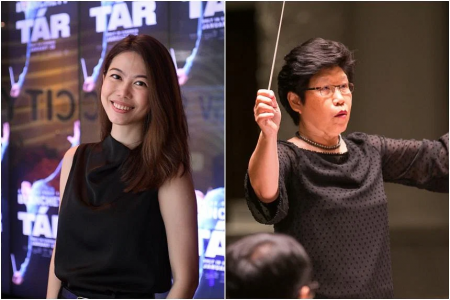S’pore female music conductors bridge the gender gap
SINGAPORE – Though school choral conductor Choy Siew Woon and Cate Blanchett’s fictional movie protagonist Lydia Tar both wear suits on stage, that is where the resemblance between art and life ends.
Choy, 35, says: “When I’m on stage, I really do feel more comfortable in a suit.”
Female conductors have come under the spotlight, what with psychological drama Tar (2022) – which is showing in cinemas – receiving six nominations at this year’s Oscars, including Best Picture, Best Director and Best Original Screenplay for American film-maker Todd Field and Best Actress for Blanchett.
The film tracks the downfall of the powerful but abusive Tar, the first female chief conductor of the Berlin Philharmonic. It was recently slammed by American female maestro Marin Alsop for potentially harming the way women in high positions are viewed.
Though the largely male-dominated industry has made strides in welcoming women and highlighting female conductors, gender issues such as clothing choices and physical gestures are still present in the local scene.
While Choy has found comfort in suits, musical director Gail Tay, 31, recently had to decide what attire was appropriate for a concert, a discussion she had with a friend and female classmate at the Royal Conservatoire of Scotland (RCS).
Over a Zoom call from Glasgow, Tay says: “Would not wearing a suit make us look less professional to the orchestra or whoever is watching? What if we wanted to wear a dress? Would it make us look less competent or trustworthy?”
“Proper” attire not only commands respect, but it also avoids reviews in which clothing choices are mentioned rather than technical ability or musical talent.
Tay says: “We were worried that if we wear something that makes us look pretty or more feminine, people might not fully focus on the music. I’ve read articles on composers and pianists, it’s not always just the music, it’s always ‘She’s wearing this’, which you never find for the male counterparts.”
Choy adds: “I have gotten comments, not just from men but women too, on how I should consider changing the way I dress on stage, maybe something more body-hugging.”
She has also heard remarks that some of her gestures while conducting are too feminine, and prefers to receive feedback without a gendered lens.
Despite this, Choy and Tay count themselves fortunate to have found general support and encouragement from male and female peers and mentors.
Tay, who is pursuing her master’s degree in music directing for musical theatre at RCS, says: “I have a couple of female mentors but most are male, even at RCS. And specifically in conducting, so far I’ve worked with all male mentors. But they are making strides to equalise opportunities across the board.”
This includes her current work on a musical production of Little Women (2005) that features an all-female creative team comprising director, choreographer and co-music directors.
Locally, the scene consists of a community small enough for many to know one another by name or reputation.
Choy says: “In the choral scene, there are actually quite a number of female conductors. It’s a very supportive space. I have never really felt any pushback as a woman.”
Vivien Goh, 75, former conductor of the Goh Soon Tioe String Orchestra and the Singapore Youth Orchestra, cites Vietnamese Helen Quach, Hong Konger Yip Wing-sie and Taiwanese Wang Ya-Hui as examples of notable Asian female conductors.
Goh says: “In the professional field, you have to win the respect of the orchestra – it doesn’t matter if you are a man or woman. Even if you’re a man, if they don’t respect you, they won’t play well for you.”
Choy agrees. “As long as you prove that you are serious about your craft, work hard, do good work and are a good person, people will respect you no matter the gender. That was what I experienced.”
Get The New Paper on your phone with the free TNP app. Download from the Apple App Store or Google Play Store now


